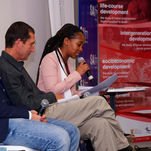
NEUROSCIENCE RESEARCH LABORATORY
WITS NeuRL



BRAIN MATTERS SEMINARS
The past, present and future of
Neuroscience in southern Africa
Aarhus and Oxford University
Prof. Morton Kringelbach
Professor Morten L Kringelbach runs the Hedonia Research Group based at
the Universities of Oxford and Aarhus. His prize-winning research uses neuroimaging and whole-brain computational models of, for example, infants, taste, sex, drugs and music to find ways to increase eudaimonia (well-being). He has published fourteen books, and over 300 scientific papers, chapters and other articles and his research features regularly
in newspapers, magazines, radio and television. He is a fellow of The
Queen’s College, Oxford, of the Association for Psychological Science, on the advisory board of Scientific American and a board member of the world’s first Empathy Museum.
SEMINAR
SUMMARY
The Parental Brain: New Insights from Brain Imaging
On 6 December 2017, the NRF Science for Society hosted a lecture entitled ‘The Parental Brain: New Insights from Brain Imaging’, by Professor Morten Kringelbach. It was held at the Nelson Mandela Children’s Hospital in Johannesburg.
The lecture was the last in the Brain Matters Seminar Series, funded by the DST-NRF Centre of Excellence in Human Development and the Johannesburg Institute for Advanced Study (JIAS), and supported by the Wits Cortex Club and the Southern African Neuroscience Society. It was presented in partnership with SAfm and the Nelson Mandela Children’s Hospital.
For many people, becoming a parent is one of life’s most rewarding and transformative experiences, yet until recently little was known about how this experience changes the brain. In this lecture, Professor Kringelbach of Aarhus and Oxford Universities shared new insights into how fast brain signatures (the rapid spread of neural activity) are evoked by the sight and sounds of babies.
He spoke about how the cuteness of infants – as a protective survival mechanism – shapes human lives. Lastly, he talked about cutting-edge research using new technologies in brain imaging that reveal specific areas in the brain that control the caregiving instinct. Professor Kringelbach’s prize-winning research uses neuroimaging and whole-brain computational models of, for example, responses to infants, taste, sex, drugs and music to find ways to increase eudaimonia (wellbeing).
Panel Discussion
Morton Kringelbach
Discussant

Professor Morten L Kringelbach runs the Hedonia Research Group based at the Universities of Oxford and Aarhus. His prize-winning research uses neuroimaging and whole-brain computational models of, for example, infants, taste, sex, drugs and music to find ways to increase eudaimonia (well-being).
Linda Richter
Discussant

Prof Richter is a Distinguished Professor at the University of the Witwatersrand. She is a Distinguished Research Fellow at the Human Sciences Research Council in South Africa, a Research Associate in the Department of Psychiatry at the University of Oxford (UK), a Faculty Affiliate of the World Policy Centre at the University of California in Los Angeles, and an advisor to the World Health Organization in Geneva on early child development.
Barack Morgan
Discussant

Barak Morgan is a biologist and medical doctor with clinical experience mostly in psychiatry. He also has a PhD in engineering. Based in Cape Town, he works as a researcher in human social – cognitive – affective neuroscience. Most of his research is in the field of early childhood development, focused on the enduring impact of early social experience, especially poverty, on brain structure and function in later life.

Facilitator

























